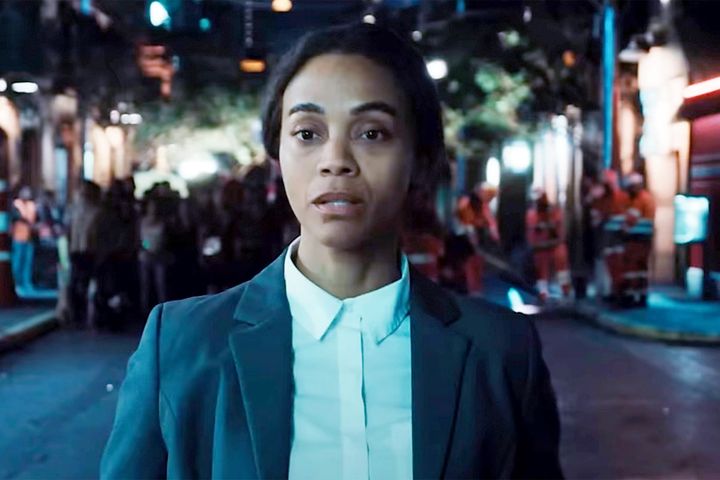
Les Saignantes at TIFF
Early in Les Saignantes, a quasi-sci-fi erotic thriller set in Cameroon in the near future, a voiceover narration informs us that it is currently 2025, and yet very little has changed from the present day. If that's so, why on earth would you set the movie in the future at all? Saignantes is inexplicable in too many ways to count, but the first and foremost such mystery is in why the film has been made as science fiction in the first place. The lame-duck attempts at fitting the story into that genre do more damage than good. This is science fiction as an underdeveloped 14-year-old with limited means would shoot it: cheap, stupid, and ugly.
The story, such as it is, concerns two prostitutes of the future (Adèle Ado and Dorylia Calmel). The opening sequence sees one of them in a trapeze sling, entertaining an aging diplomat with gravity-defying dances. After a lengthy montage sequence of warm flesh and chitinous muscle, the diplomat goes ahead and dies under the hooker's tender caress. The rest of the film somehow involves the unbelievably gorgeous pair of women attempting to deal with this crisis, although how they do so becomes more and more mystifying with each passing turn. We are eventually dragged past such varied elements as a prevailing social fondness for "W.I.P." parties (Wakes for Important People); a secret society of matriarchal power called Mevoungou; and naturally, the hookers' use of kung-fu. Yes, it's that kind of movie: two lead characters who aren't even particularly good at striptease for the first three quarters of the film, suddenly evolve martial arts skills in the last ten minutes, for no seeming reason better than the director's fetish interest in just how far up their skirts he can put his camera. (Both women have, of course, already doffed their panties by this point.) Les Saignantes is worse than bad; it plain doesn't make any sense.
Writer/director Jean-Pierre Bekolo's script is an outright disaster, sporting limp dialogue, nonsensical plotting, and atrocious use of god-like voiceover. His direction is little better; the film is over-eager and over-amped, favouring ludicrous jump cuts, music-video editing, and a neon lighting style that paints every single scene in an oversaturated day-glo pastel colour, like Natural Born Killers run amok. The film is shot on digital video, which slickens and sharpens the product, and could have made the intense visual style work, if Bekolo had any real idea of what to do with his staging. The resulting work, however, is merely reminiscent of amateur videography. It ultimately becomes a very difficult film to watch at all.
Bekolo is clearly trying for some kind of advanced meaning here; his treatment of the prostitutes (Mevoungou's avenging feminism notwithstanding) seems exploitative at most points, yet the script seems to be attempting to make a grand statement about the plight of women, describing them with lines like "two holes that always get screwed in the end." Additionally, Bekolo occasionally interrupts the film for an interstitial title card that reminds the audience that it is watching a film by posing a question; for example, "How can you make a horror film in a place where death is a party?" There are five or six of these throughout, but the final title card, at the close of the picture, is the most telling: "How can you watch a film like this and do nothing after?" The answer is simple: because vomiting in a movie theatre takes too long. We want out.
Latest Videos
Latest Videos
Join the conversation Load comments







